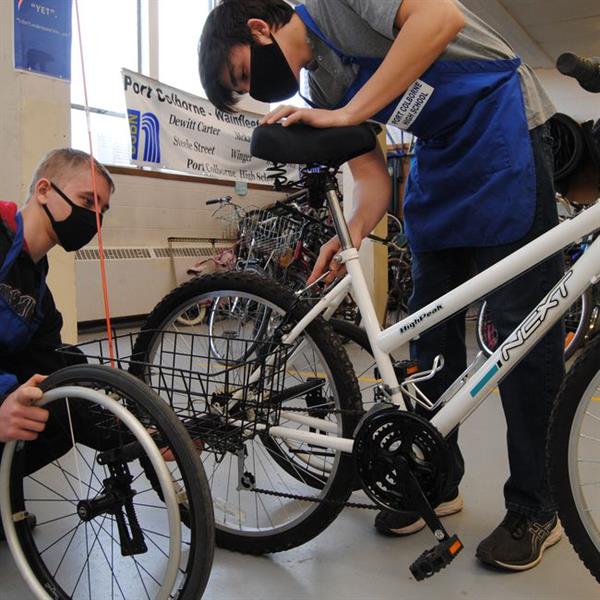
If there’s one thing that drives Aubrey Foley nuts, it’s hearing that someone has been left behind. Inclusivity and accessibility, especially for children, has been his lifelong mission.
Through the Broken Spoke program which he founded, Foley has helped build more than 12,000 bicycles, every one of which has been donated to those who can not afford their own bike.
When he recently heard about a young girl who was unable to go cycling with her two brothers because she suffers from mobility issues, Foley sprang into action.
“That little girl is never going to be left behind ever again, thanks to this,” said Foley, gesturing to the first ever accessible bicycle produced by the Broken Spoke program. “It’s not perfect, because this is the prototype and we’ve never done anything like this before, but it works and it’ll get the job done.”
The Broken Spoke program is a collaboration between Port Colborne High School and the Niagara Region’s waste management department. Whenever broken bicycles wind up at one of Niagara Region’s landfills or recycling facilities, staff collect them and hand them over to Foley, who brings them to Port High.
Once they’re at the school, Foley uses his decades of experience fixing bikes to show students how to strip the broken bikes down into their components, then identify what’s good and what’s beyond repair. The various parts are then repurposed Frankenstein-style and pieced back together to produce fully functioning bicycles.
Not only does the Broken Spoke program remove thousands of pounds of waste from landfills, it also teaches students about bicycle repair; a practical and useful skill, which also earns them a high school credit.
“I really like this program because being able to fix my own bike has been a really helpful thing to know about,” said Ethan Jaques. To get to and from his part-time job, Jaques would ride his bike, and he said knowing how to do repairs on his bike has saved him a lot of time and money.
Broken Spoke students also said working on the accessible bike was an interesting side-project to tackle.
“It was neat because there were a lot of specialized parts and stuff. It wasn’t like working on a regular bike,” said Ethen Molmar.
Getting the accessible bike into the hands of a child who needs it is something Foley said he and his students are proud of, and they’re also proud that they’ve managed to remove so much waste that would otherwise be sitting in a local landfill.
“This accessible bike was made from a landfill bicycle, with parts from a landfill wheelchair. The only new thing in that bike is the time we invested in it,” said Foley.
For more information about the Broken Spoke program, including how to donate your old or broken bicycle, visit https://porthigh.dsbn.org/clubs/broken-spoke-bike-program
By James Culic Reporter, Port Colborne Leader